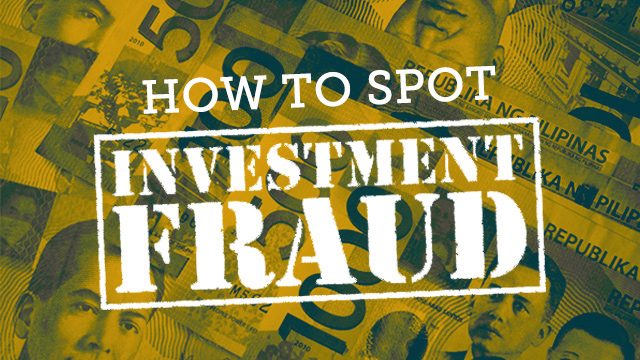SUMMARY
This is AI generated summarization, which may have errors. For context, always refer to the full article.

MANILA, Philippines – There is no such thing as a foolproof financial journey. Money mishaps can happen to anyone (rich or poor), so it is best to be informed on what to watch out for.
As an investor, one of the biggest mistakes you can make is to participate in get-rich-quick schemes. These scams often operate by promising big earnings in the shortest possible time. Unfortunately, many have fallen for these traps, losing millions of pesos in the process. (READ: Not all that glitters is gold).
Lately, the term ‘investment’ is being put under a dubious light, and even the names of reputable financial institutions are being dragged into the picture. Nowadays, a logo on the cheque or the document isn’t always a guarantee that a transaction is legitimate.
Vigilance and prevention are your best assets against these criminal parties. Before handing over your hard-earned savings to any investment program, be on the lookout for these red flags: “Risk-free,” “Instant wealth,” “Guaranteed high returns”
“Risk-free,” “Instant wealth,” “Guaranteed high returns”
If the offer is being pitched as a safe and worry-free investment, drop it. Even the most seasoned financial experts will tell you that there is no such thing as a totally sure investment. In the financial playing field, there is always some degree of risk, brought about by various factors such as market movement, the current economic landscape, and your own individual day-to-day decisions. If the investment scheme sounds too good to be true, it probably is. Incomplete, vague, or confusing credentials
Incomplete, vague, or confusing credentials
“Where is your office? Do you have a website? Can I ask for your card and your contact details?” Don’t hesitate to ask all the important questions. Much like looking for a date, you’ve got to find out if a particular product is fit for you.
Ask also about historical returns, minimum placements, and the like. Basically, find out how much you need to invest, the projections for gain or loss, along with your options for liquidating or cashing in your earnings. If the “broker” cannot simplify the jargon or explain the terms clearly to you, be wary.
Always do a background check on the person or company with whom you are transacting. You can inquire with the Securities and Exchange Commission (SEC) if the company is duly registered to sell investment products. Pro tip: add the terms “scam” or “bad review” to the name or company when you do an online search to find out any negative news or review.  “Give me your money now!”
“Give me your money now!”
Sound financial advice always comes with a sense of urgency. But if an individual is too pushy and in a rush to get your money, then proceed with caution. Good financial advisors will allow you to think things over, do your own research, and ask as many questions as you want. Don’t fall for stories such as “My friend waited for a week and lost the chance to earn 200 percent immediately.” Again, even in the best channels, there is never any guarantee that someone’s gains will always surely be the same with another. There’s no product
There’s no product
Not all networking schemes are inherently bad. But be wary if the investment program does not involve an actual product, i.e., you will earn solely through referrals and recruitment.
That said, the existence of a product is also not the sole guarantee that the investment is legitimate. For example, if an individual mentions insurance as a benefit or a product, ask for an illustration of the benefits of the policy. You may request that it be tailor-fit to your profile and your needs. Slam the scam: report fraudulent investors
Slam the scam: report fraudulent investors
If you suspect that you’ve been approached by a scammer, report them to the SEC’s Compliance Monitoring and Enforcement Department at +632 724 7650 or +632 727 2267. In case of emergency, seek NBI or police assistance immediately.
Keep dated records of all your transactions and correspondences (emails, text messages). Always ask for a company’s SEC license and full office contacts. Remember that company registration papers are not enough. The company must have a permit from the SEC to sell the specific investment product. Demand provisional or official receipts at all times. Refuse promissory notes or post-dated checks as these do not guarantee that you will get paid or reimbursed for your transactions.
Finally, always do your research. When it comes to growing your wealth, you’ll have better peace of mind to consult only with licensed financial advisors. – Rappler.com
Sun Life Asset Management Company, Inc. (SLAMCI) is taking a stand against investment scams through the campaign “Slam the Scam.” A mini-series hosted by Matteo Guidicelli shows how people can spot potential investment fraud and separate the B.R.I.G.H.T. from the dubious. For more information, visit brighterlife.com.ph.
Add a comment
How does this make you feel?
There are no comments yet. Add your comment to start the conversation.